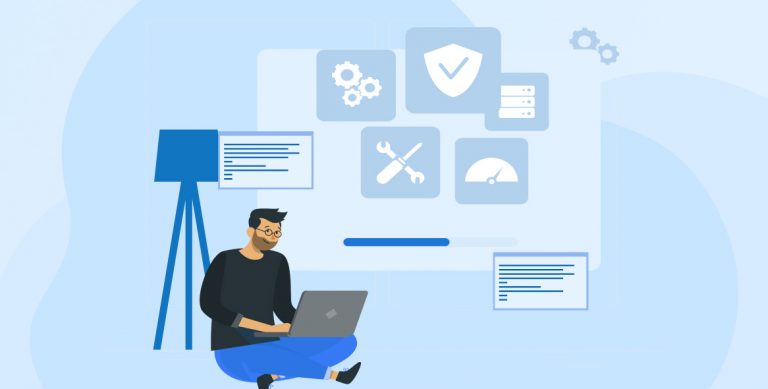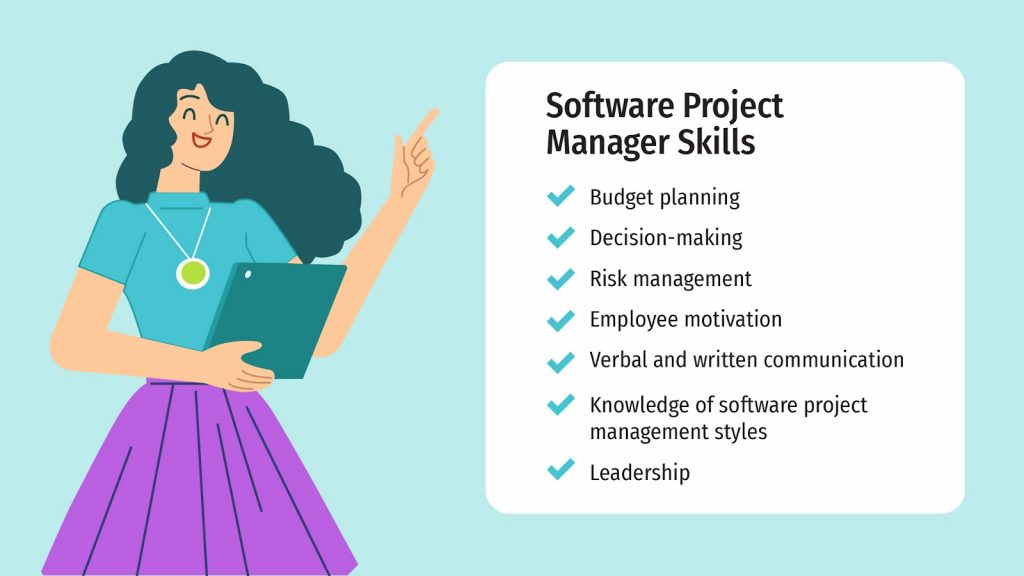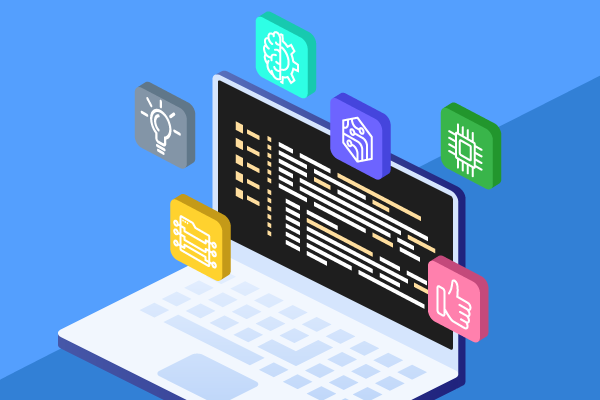Software Project Manager: Roles, Skills, Qualification, Packages
Stepping into the world of software project management? You’re making a smart move. This dynamic role is in high demand and offers attractive salaries. For instance, software project managers at Apple and Tesla earn an impressive average of $262,805 and $230,712 annually, respectively. Do you also want to unlock these opportunities? If you do, you are not alone, but here we are to help every one of your sort. With this guide, you will be well-equipped with all the necessary details about software project management, from its roles and responsibilities to qualifications and required skills. Learn all the qualifications and skills essential to get the highest-paying opportunity. Let’s get started to take your career to newer heights.
What is a Software Project Manager Role?

A software project manager organizes software projects, paints a transparent picture for the software engineering teams, and assigns tasks as per the project requirements. They link the ropes of leadership skills, technical knowledge, and experience to ensure the software meets client requirements.
Imagine a typical day in their life. They are stratagems, choreographing a ballet of tasks in a fast-paced work environment that thrives on accuracy and timeliness. Technically narrating, if you look at the software project manager job description, you’ll find a myriad of captivating duties — from conceptualizing project scopes to delivering the final product.
What Does a Project Manager Do in Software Development?
In the realm of software development, the software project manager plays a crucial role that varies based on their specific job, company, and industry. A day in their life entails managing a wide range of responsibilities in a fast-paced environment. Let’s delve deeper into the specifics of a software project manager job description.
- First and foremost, a software project manager manages the JIRA defect log and issues, a task that showcases the extent of their resourcefulness and leadership skills.
- They utilize CRM to manage the resolution of customer issues, ensuring customer satisfaction and building long-lasting relationships.
- They lead the delivery of diagnostic GUI design and service workstation applications.
- Presilicon and postsilicon verification, as well as audio and trace debugging, also fall under their purview.
- They take charge and lead cross-functional teams focusing on software stability.
- The job demands creativity and a knack for paying meticulous attention to detail.
- They engage in the development process and often become part of creative solutions.
In essence, the software project manager responsibilities go beyond the textbook description and delve into a realm of creativity, resourcefulness, and acute detail orientation. Their crucial presence contributes to the smooth functioning of the entire project, thereby affirming the indispensability of their role. The software project manager job may sound challenging, yet with the right blend of creativity and resourcefulness, it’s one that offers profound satisfaction.
Roles & Responsibilities of Software Project Manager

As a software project manager, the cornerstone of your role involves building a roadmap for the team, leading them towards successful project completion with a strategic vision and hands-on management. Your responsibilities are critical and diverse, allowing you to influence the project output at every stage.
1. Planning Everything from Execution to Delivery
Your strategic insight serves as a lighthouse for the team, guiding them from the project initiation phase through to delivery. You’re not just molding the software project manager job into a supervisor’s role; you’re laying the groundwork for the project with a keen knowledge of estimation techniques that determine project constraints, time, cost, and overall effort required. Preparing the team and resources according to schedules and staffing plans is also your prerogative, making you a key player in the software project’s foundation.
2. Oversee the Software Development Team
At the crossroads of management and software development, you’re tasked with leading a group of talented professionals towards achieving common project objectives. Your software project manager responsibilities extend to managing the JIRA defect log, utilizing CRM for customer issue resolution, leading diagnostic GUI design, and lending leadership to cross-functional teams for software stability. You’re the one ensuring that everyone is working in sync, maintaining the rhythm of the software development life cycle.
3. Delegating Work Effectively
Your role doesn’t just end at planning and management; you’re also the go-to person for assigning the right work to the right people. This aspect of the software project manager job description ensures that all tasks are carried out efficiently, preserving the balance of workloads and preventing bottlenecks in the software development process.
4. Monitoring Progress and Tracking Roadblocks
While on your route towards project completion, keep an eagle’s eye on the progress of the team. Use agile reports, Scrums, Burndown charts, and other project estimation tools. These give you a clear picture of story points completed during the sprints and any areas where the team might be lagging, enabling you to take swift corrective steps and ensure continual improvement.
5. Managing the Deployment Deliverables
As a software project manager, you’re not just limited to observing; you’re also responsible for delivering results. This part of the role of software project manager involves overseeing software projects from start to finish, ensuring customer satisfaction through presentations, and managing the delivery of the final product. The cycle of a software project fully rests in your commanding hands, making your role crucial for project success.
Software Project Manager Required Skills

In the role of a software project manager, you must be equipped with specific skills that can keep you on top of your game. These crucial skills not only strategically shape your work but also increase your effectiveness and productivity in different stages of project management, which we’ve described before.
- Firstly, you must keep learning to update your knowledge of new tools, programs, and resources.
- Practice to stay relevant and adaptable in the fast-paced and constantly changing software industry.
- A keen understanding of agile frameworks that support software development.
Software Project Manager Required Qualifications
Building on this, you might want to consider earning certifications through organizations such as the Project Management Institute or the American Academy of Project Management. Holding certifications like this can showcase your project management qualifications to potential employers. This differentiation can give you a competitive edge and might lead you to higher-paying jobs in the field.
Software Project Manager Required Technical Skills
As you delve deeper into the software project manager job, it should be increasingly clear how vital technical skills are in this role. Mastery of certain technical constructs forms the backbone of a successful software project manager, propelling them miles ahead in their career.
- A certain level of proficiency in Agile grants software project managers the flexibility and dynamism necessary to manage the rapid iteration central to software development.
- The practical skills to navigate and exploit specific software essential to the role. Such as JIRA.
- In your role as a software project manager, the interplay between technology and people management couldn’t manifest more saliently.
- Your adeptness in managing stakeholder relationships, negotiating with vendors, and overseeing project timelines and budgets are vital.
- A solid grounding in technical areas is imperative when you need to comprehend the nuances and specifics of software project requirements.
- This software project manager responsibility is pivotal as it empowers team communication, ensuring all are on the same page regarding tech requirements.
- The role demands a blend of leadership skills, sharp tech knowledge, and the ability to direct teams to ensure software aligns with client stipulations.
What Software Project Management Role is in Demand?

Having established the prominent role of a software project manager, you’re probably contemplating what sets this profession apart from other project management roles. Software Project Management is about meeting deadlines and adhering to a budget and encompasses a unique blend of challenges and intricacies.
Merges Technical Skills and Creativity
A key factor that makes software project management distinct is the cohesion of technical and creative expertise. Good software doesn’t just heed technical infrastructure but also caters to creativity and user interface. A software project manager needs proficiency in understanding complex functions and integrations while simultaneously ensuring an appealing and intuitive user interface. This merging of technical and creative aspects can make the software project manager job description quite unique compared to other managerial roles.
Specialized Software
The role of a software project manager involves the utilization of Specialized software like Jira, GitHub, ClickUp, GanttPro, Smartsheet, etc. These tools help streamline the otherwise bewildering task of allocating resources, managing risks, and monitoring progress. Your software project manager responsibilities aren’t just about using such software but mastering it to deliver optimal project outcomes.
Ambiguity of End Results
Another striking aspect of being in a software project manager job is dealing with the ambiguity of end results. Unlike a construction or manufacturing project, software development does not have a tangible output until it’s completed. This could add an extra layer of complexity while defining project scope and creating schedules.
Abstract Troubleshooting
The challenges you’ll face as a software project manager aren’t simply about meeting timelines and keeping stakeholders happy. Abstract troubleshooting is a major part of the software project manager job, including anticipating potential hitches in the project and devising preemptive strategies to tackle them. You’ll need to employ critical thinking and decision-making skills in navigating through these intricacies.
Third-party Software Updates
Lastly, a crucial concern only specific to the field of software development is dealing with Third-party software updates. If your project incorporates third-party software, your entire project timeline could be at the mercy of another company’s update. Hence, developing a buffer for such unforeseen discrepancies becomes another unique responsibility of a software project manager job.
The Future of Software Project Management

One thing’s for sure: the software project manager job description won’t be stagnant. It’ll continuously adapt, requiring you to acquire and hone new skills, even the unconventional ones. Among these, agile project estimation will gain prominence. It’s a method that assists both scrum and kanban teams in comprehending their capacity. Agile reports will become the standard, tracing progress over time. What about the good old Gantt charts? They’ll remain relevant, too, alongside backlog grooming, helping you keep the tally of work up-to-date and ready to go.
Ultimately, in the evolving landscape of software development, the actions of a software project manager will continue to shape the quality and success of software directly. You’ll become more than just a manager – you’ll be the lynchpin connecting a project’s vision with its realization. An exciting future awaits… and there’s no better time to be part of this evolution than now.
Conclusion
Navigating the future of software project management demands agility and a commitment to continual learning. You’ve got to master new skills like agile project estimation and draw wisdom from previous experiences. It’s not just about managing tasks anymore. Your role expands to strategic leadership, optimizing resource allocation, and making accurate project budget forecasts. You’re the linchpin, bridging the gap between vision and reality in the ever-evolving software development landscape. So, gear up, embrace the change, and lead the way to successful software projects.
Frequently Asked Questions
Q1. What is the future of software project management?
The future of software project management encompasses a wider scope of responsibilities. This includes acquiring new expertise like agile project estimation, intelligent resource allocation, project budgeting, and strategic leadership. Managers are expected to leverage lessons from past projects to ensure successful outcomes.
Q2. Why is adaptability important for software project managers?
Adaptability is crucial for software project managers as the landscape of software development is always evolving. They need to be able to adjust to the changing demands of the projects, stay ahead of new technologies and development methodologies, and manage project risks efficiently.
Q3. What key skills should future software project managers focus on?
Modern software project managers should focus on developing agile project estimation skills, learn to optimize resource allocation, cultivating strategic leadership, make accurate project budget projections, and leveraging lessons learned from past projects.
Q4. How is the role of a software project manager important in a software project?
Software project managers bridge the gap between vision and realization in software development. They’re responsible for planning, executing, and overseeing the project to ensure it meets the client’s requirements and is delivered on time, thereby shaping the quality and success of software projects.
Q5. How is the role of software project managers expected to evolve in the future?
The role of software project managers is foreseen to expand beyond traditional boundaries. This includes assuming more responsibility in strategic planning, budget projections, resource management, and not just confined to technical task execution. They will play a more strategic role in connecting business goals with project outcomes.

Leave a Reply